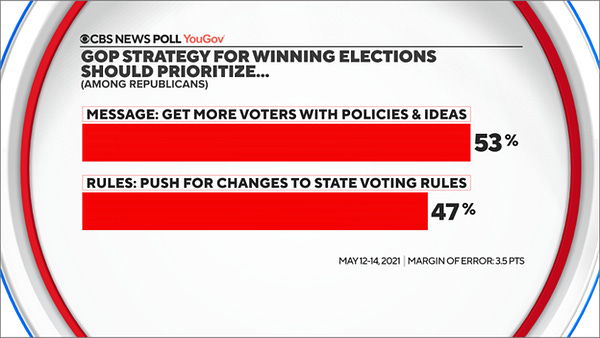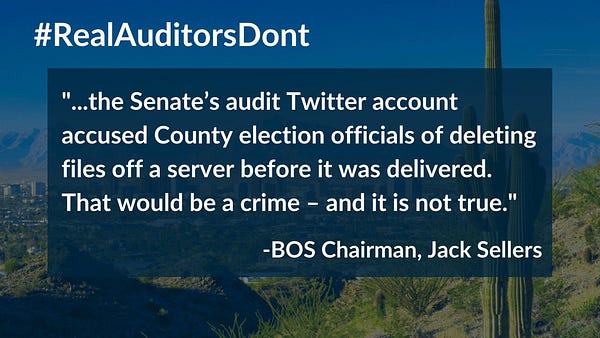Here’s the headline from Harry Enten’s CNN’s analysis: “Why GOP leaders are playing it smart when it comes to Trump.”
Since it’s Monday, let’s talk about the word “smart” for a moment.
Enten looks at some early polls and concludes that “the statistics reveal that Republicans may be playing it right when it comes to Trump.” The cancellation of Liz Cheney may look messy, but the base likes it, and the GOP is doing well on generic matchups. As Enten notes: “Republicans are in no worse position than they were in the 2020 election. In fact, they're actually polling better now on the generic ballot than they were heading into the last election by about 3 to 4 points because polling across the board underestimated Republicans.”
“The best case scenario for Republicans,” he writes, “is to turn out his voters, while trying to keep Trump out of the limelight.
“Right now, it could be argued they're doing exactly that.”
So coups, conspiracy theories, cultic loyalty, and purges turn out to be acts of heartbreaking political genius after all?
I respect Enten’s work, so this is worth some thinking about, if only as a reflection of the internal ethos of the swamp.
We can easily recognize this logic: Success — measured by polls, or profits, or high grades — is “smart” if you don’t dwell too much on other metrics. A company may pollute the environment, cut corners on quality, and game its taxes but be considered “smart” if it leads to profits. The kid on the playground who gets in his secret punches, but then gets a gold star from his teacher is “smart.” A sports team that cheats to win the World Series and gets to keep the ring — “smart.”
And a politician who gaslights and lies, but still polls well, can expect the muted applause of cynical punditry. Getting away with it is all that matters, because #winning.
Enten is right: this is what Republicans are telling themselves. And even though it may be cynical and amoral, that does not mean that their analysis is totally wrong.
As Bill Kristol pointed out in the Bulwark last week, there are reasons to be worried. Polls suggest that Republicans are coming home, and are now more engaged than their Democratic counterparts.
Over the weekend, the pollsters at the Democracy Corps sounded a similar alarm, warning that their surveys make it “painfully clear Donald Trump, Lindsey Graham, and Kevin McCarthy know their party.”
“The Trump loyalists who strongly approve of him are two-thirds of those who identify as, ‘Republican.’,” they write. “And they are joined by the Trump-aligned to form a breathtaking, three quarters of the party in the electoral battleground states and districts that will decide who leads the country.”
We were also surprised by how much Donald Trump’s loyalist party is totally consolidated at this early point in its 2022 voting and how engaged it is. Yes, they have pulled back from historic presidential year levels: the percent scoring 10, the highest level of interest in the election, has fallen from 84 to 68 percent. But Democrats’ engagement fell from 85 percent to 57 per-cent. Republicans are following their political theater much more closely than are Democrats — producing an 11-point gap.
**
Politico’s playbook provided another antidote to Democratic complacency:
— While it might look like a shitshow in Washington, the [GOP] is more like a hurricane gathering strength off shore that will wallop Democrats beginning in 2022. The Republican Party has a structural advantage in the House, Senate and Electoral College. It controls redistricting in a majority of states. Most ominously for Democrats — and democracy — it is using its power in statehouses and governors’ mansions across the country to pass voting laws that solidify these advantages.
**
A cautionary note: it is still early days and the political environment can shift rapidly. But, as Kristol wrote here last week, we could all use a dose of hard reality: It is “worth coming to grips with the fact that the contemptible, even dangerous, behavior by the overwhelming majority of House Republicans does not automatically mean that they will be punished politically.”
The arc of off-year elections is short, and it may not bend toward justice….
But the beginning of wisdom is to recognize the situation, to overcome complacency and resist wishful thinking. The beginning of wisdom, as Tocqueville put it, is to “have that salutary fear of the future that makes one watchful and combative, and not that sort of soft and idle terror that wears hearts down and enervates them.”
Tilting at Windmills?
My latest piece looks at the effort by prominent former Republican officials to fix or replace the GOP.
It would be nice to think that a group of former Republican officeholders — folks who have won state and national elections — would be able to make one last stand to save the party from the extremists and the cranks.
Indeed, the Washington Post op-ed argued that: “With Cheney’s dismissal from House leadership, the battle for the soul of the Republican Party — and our country — is not over. It is just beginning.”
But that’s not true. The fight is over. The crackpots, conspiracists and bigots have won, and there is no point pretending that this is a party that can be salvaged anytime soon. As Jeff Greenfield notes in Politico, there is no civil war in the Republican Party — there is only a “purge.”
The group seemed to acknowledge that when they promised that “We will not wait forever for the GOP to clean up its act.”
But, what are they waiting for now?
How many signs do they need? How many canaries have to die? How many red lines have to be crossed?
You can read the whole thing here.
An authoritarian party. Make sure you read Ben Parker in this morning’s Bulwark: “The GOP’s Telltale Signs of Authoritarianism.”
And then, of course, there’s the brain drain….
The Republican party has shed many of its legal, economic, foreign policy, and political experts—the very people who enabled it to govern. Its new leading legal light is Rudy Giuliani. Its foreign policy guru is . . . maybe Sen. Rand Paul? (Sorry, Mike Pompeo.) Its most accomplished economist is Larry Kudlow.
The Trumpist “intellectual” movement is a bit like the Soviets’ ersatz space shuttle—it never really got off the ground.
To Trump and his supporters, this is all an asset, not a liability. Sycophants are the only people who won’t threaten the power structure. But in the long run, the imperatives of internal politics conflict with those of external politics. At least in theory, a political party’s purpose is to win and hold power. How is the Republican party supposed to do that if all the smart, experienced, well-trained, well-organized people have left the party?
As our colleague Amanda Carpenter suggests, reflect on this for a moment:


Must-read: Via Jonathan Swan at Axios: “Trump's war with his generals.”
Miller told associates he had three goals for the final weeks of the Trump administration: #1: No major war. #2: No military coup. #3: No troops fighting citizens on the streets.
Meanwhile:





Why Cheney matters. Will Saletan writes in Slate:
There’s no magic force field around America that protects us from falling into anarchy or tyranny. What protects us—what makes us “exceptional,” in Cheney’s words—is a system of elections, laws, and courts, which in turn relies on enduring popular support for these institutions. Cheney understands how easily this consensus can be shaken….
Maricopa County has seen enough. This is from the Republican county recorder from Arizona’s biggest county:


And this thread is worth your time:



Cheap Shots
Dan Crenshaw bids to be the Elise Stefaniks of Lindsey Grahams.


Dear Leader.



ICYMI the first time around:






